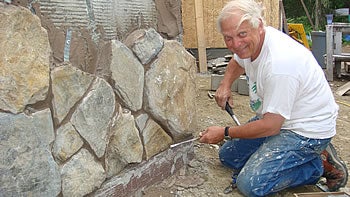‘Gap year’ an adventure for ECU physician
A gastroenterologist and professor of medicine at the Brody School of Medicine at East Carolina University, Sinar learned stonework in Alaska, eastern medicine in Nepal, furniture refinishing in New Jersey and archeology in Romania.

Dr. Dennis Sinar learned stone masonry in Alaska during his “year of adventure.” He’s now back at work at the Brody School of Medicine. Contributed photo
“Everyone I’ve talked to who’s 50 or older says, ‘I wish I could do that.’ Well, you can,” Sinar said. “It’s rejuvenating to do it.”
Sinar, 61, chose the four trips to complement his vocation – medicine – and one of his favorite avocations – restoring old houses.
“At the start, I needed to break out of a routine,” said Sinar, who has been on the ECU faculty since 1981. “In Alaska and Nepal I learned artistry from a stone mason, compassion and a commitment to patient care from eastern medical physicians, and countless lessons from the people of Alaska and Nepal. In New Jersey I learned artistry. In Romania, I felt curiosity about life in the USA from a people who produced Vlad Dracula. I felt their sprit in the rugged and beautiful hills of Transylvania. Any of these lessons required some work on my part to take the first step, but the reward was well worth it.”
Overcoming fears about cost, time away from work, family commitments and other topics is the first step to taking a gap period, said Holly Bull, president of the Center for Interim Programs, who helped Sinar set up his travels. “A lot of my job is permission-giving,” Bull said. “The reality is you can take this kind of time, and you don’t have to take a full year.” Even a month, she said, “can give you that infusion of energy.”
Sinar returned home between each leg of his travels. He kept costs low with no-frills accommodations, often sharing quarters with others. That also provided more local flavor to his travels, such as in Nepal, where he stayed with a Tibetan family and a pair of Buddhist trainee volunteers.
“They had heard that I was an astrologer – apparently the local translation for ‘gastroenterologist’ – and were disappointed I could not map their star charts,” he said.
Sinar has put his stonework skills to use on brickwork at his home in Washington. He also said the travels reaffirmed why he went into medicine – the patient contact – and he has used listening skills he learned while away.
“In Nepal, all of the patients I saw with my preceptor spoke either Tibetan or Nepali, so the interview was done in their native language by the preceptor,” Sinar said. “I relearned that a lot of information can be gained in the medical interview by nonverbal clues. The language difference made me focus more on those nonverbal clues of body language, vocal tone, facial expressions to assess the patient’s complaint. I do more of that form of listening with my patients now, and think I gain more information than I did before.”
For people who don’t even have a month to spare or cannot afford to be gone that long, Bull’s organization can set up programs as brief as a weekend. “It can really be tailored to your situation,” she said. “For people who are thinking about a sabbatical, this is a way to do some interesting things.”
Sinar worked out a schedule for the year that suited him and his partner, Kathryn.
“Kathryn was incredibly understanding of my need to do this year,” he said. “I planned it so that I was gone for a block of time, then home for a block, so I was home for about half the year, working with her on our house remodeling projects.